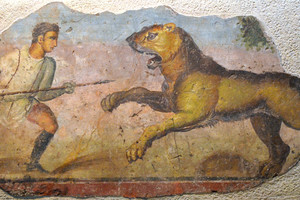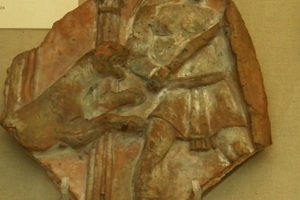Venator
A venator (Latin: venator) was a type of ancient Roman gladiator who specialized in exhibition hunting of animals but did not engage in close combat with them, unlike the bestiarii. Often, venatores performed tricks with animals, such as placing their hand in a lion's mouth, riding on a camel while leading lions on leashes, or making an elephant walk on a tightrope (Seneca Ep. 85.41). Venatores were not gladiators in the traditional sense, but their performances were part of the gladiatorial games.
Sometimes venatores are considered more as performers than gladiators. Nevertheless, their role was to demonstrate their skills and bravery in interacting with wild animals during public spectacles. Unlike the bestiarii, who fought and killed animals, venatores focused on showcasing their ability to manage and perform daring tricks with these creatures.
Performances and skills
- Animal Tricks: Venatores were known for performing a variety of impressive tricks with animals.
- Exhibition Hunts: Though they did not engage in direct combat with animals, venatores participated in staged hunts meant to entertain and astonish the audience. These hunts were choreographed to display the venator's courage and skill in handling animals.
- Animal Management: The skills of a venator went beyond mere tricks; they needed a deep understanding of animal behavior and the ability to train and manage various wild animals, including lions, leopards, elephants, and other exotic creatures.
Social and Cultural Context
Entertainment Value: Venatores significantly contributed to the grandeur and diversity of Roman games. Their performances were an integral part of the ludi (games), which also included gladiatorial combat, chariot races, and theatrical shows.
Public Spectacles: The presence of venatores added an element of excitement and danger to the games, drawing large crowds eager to see the interactions between humans and wild beasts.
Non-Combat Role: Unlike gladiators who fought to the death, the performances of venatores were more focused on demonstrating human superiority over nature and the ability to tame and control wild animals. This was a different kind of spectacle, emphasizing human ingenuity and bravery without the bloodshed of gladiatorial combat.
Seneca, in his Moral Letters to Lucilius (Epistulae Morales ad Lucilium), mentions the feats of venatores. In letter 85.41, he describes their daring acts and impressive control over the animals they performed with.
Venatores played a unique role in the entertainment culture of ancient Rome. Their performances required a blend of bravery, skill, and a deep understanding of animal behavior. Although they were not gladiators in the traditional sense, their contributions to the games were crucial in providing a varied and thrilling spectacle for the Roman public.




